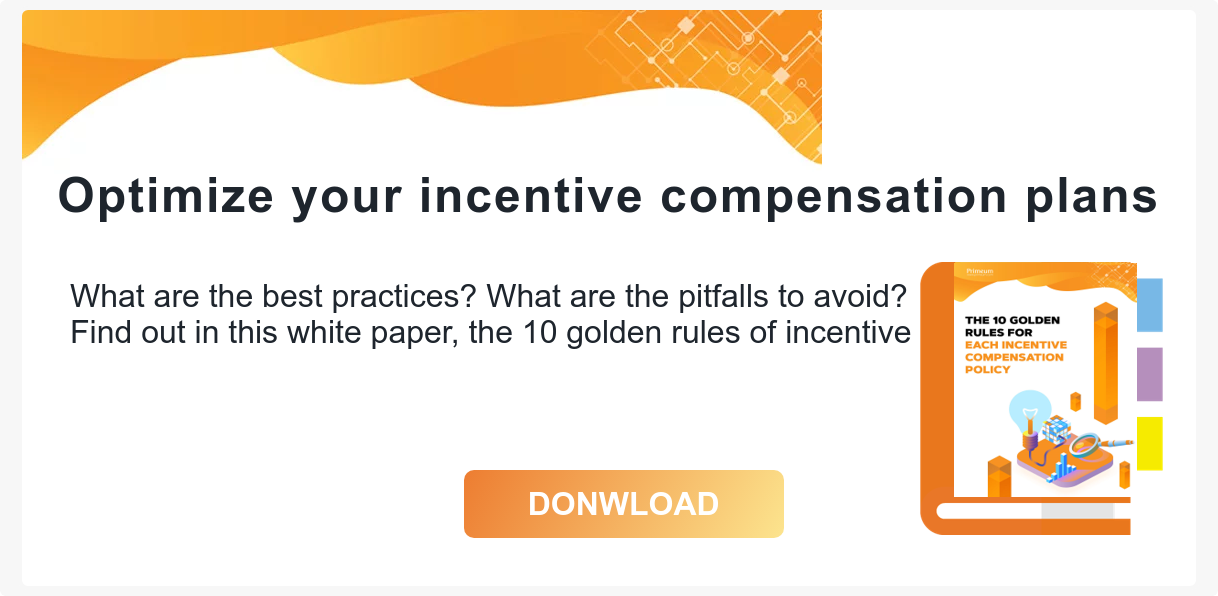To try it was to adopt it. Large groups as well as SMEs are increasingly using incentive compensation. For their sales teams of course, but also for - almost - all their employees. Although it is true that the criteria and individual objectives are still dedicated for the sales people. Back to the reasons for this craze.
INCENTIVE COMPENSATION FOR ALL: A SOLUTION TO REVITALIZE THE COMPANY
The increase in the turnover of a company is not the exclusive fact of its sales teams, but rather the result of the combined efforts of all its employees. However, managers often neglect teams that have a low impact on the evolution of turnover (accounting, human resources, etc.) for the benefit of commercial agents who are bonus subscribers. Other units may provide the least effort because they do not feel really involved in the life and goals of the business.
LARGE COMPANY/SMEs: COMMUNICATION TO BETTER MOTIVATE
Paying an incentive compensation is the first step moving to the performance and dynamism of teams that do not directly impact the board.
It is essential to take the time to communicate and inform all employees in order to encourage their adherence to the overall compensation plan put in place by their company. This expanded communication aims, at first, presenting to employees all the benefit they will have by improving their performance. And then to allow employees to understand how their new mode of compensation works. This is the rule of transparency in a good climate of trust in the company.
 If the incentive is put in place, it is not a matter of compensation only, but especially in communicating on this approach and the positive spin-offs as well as the objective for each to implement the work needed to get a bonus.
If the incentive is put in place, it is not a matter of compensation only, but especially in communicating on this approach and the positive spin-offs as well as the objective for each to implement the work needed to get a bonus.
To do this, everyone must assess themselves and think about the different strategies that will allow them to optimize their results, both individually and collectively.
A good communication plan must be structured in various levels of exchange, first with the different team leaders, then in a second stage with all the staff. The manager should provide a presentation of the company, its vision and objectives, and then address the incentive compensation component, while emphasizing the benefits that each party will receive.
COMPENSATION, A POWERFUL MOTIVATION LEVER
Six out of ten salespeople believe that their overall compensation is a major motivator for work. But contrary to what many managers may think, salespeople are not the only category of employees to whom this principle applies! The latest study by Hay Management in 2016 on salaries showed that 61% of employees are considering changing jobs for the sole purpose of getting a more attractive compensation.
Of course, variable pay compensation is not the only tool to encourage performance (see our motivation wheel). But inadequate compensation may have deleterious effects on motivation.
To avoid a massive turnover in your company, think that the fixed salary is not the only lever you may have. A variable part, truly incentive, is likely to boost the motivation, and therefore the performance, of your teams. Better: this decreases the tensions on the demand for an increase in the variable part, but it also offers the company a guarantee of less risk taking in its remuneration policy.
To summarize, incentive compensation is an excellent motivation tool for all staff ... if it is properly defined. In many cases, companies choose to adopt a two-bonuses model, one being based on each individual's goals, the other being a commission on the employee's outcome.
INCENTIVE COMPENSATION IN THE WHOLE COMPANY, FOCUSED ON QUANTIFIABLE OBJECTIVES
 Paying salespeople according to the bonus on objectives is usual. We know in advance that indicators such as sales figures, turnover or the quality of the client portfolio will be used for the evaluations. For the other functions of the company, the approach is more complex, but still achievable. A requirement: the objectives must be clear, quantifiable and easily measurable.
Paying salespeople according to the bonus on objectives is usual. We know in advance that indicators such as sales figures, turnover or the quality of the client portfolio will be used for the evaluations. For the other functions of the company, the approach is more complex, but still achievable. A requirement: the objectives must be clear, quantifiable and easily measurable.
Examples of key indicators by job position:
HR: Recruitment rate, integration rate for the newcomers
Call centers: Number of sales pitches developed for outgoing calls, number of calls handled for incoming calls
IS : Deadline for reply tickets, progress on planned developments from one quarter to the next
Payroll: Quality of entry, error rate
In practice, a collective bonus often motivates less than an individual bonus. A collective variable pay plan is also a good solution when it is not really possible to adopt a compensation at the individual level (except risking to increase the pressure on the customer, as is sometimes seen in retail). By creating collaborative behaviors at the team level, the collective bonus also increases the tendency of some to rely on the group and thus to cause some discomfort of others.
The individual bonus is not deleterious ... on the sole condition of being used wisely and respecting the criterion of fairness, essential to the motivation and the well-being of your sales representatives.





